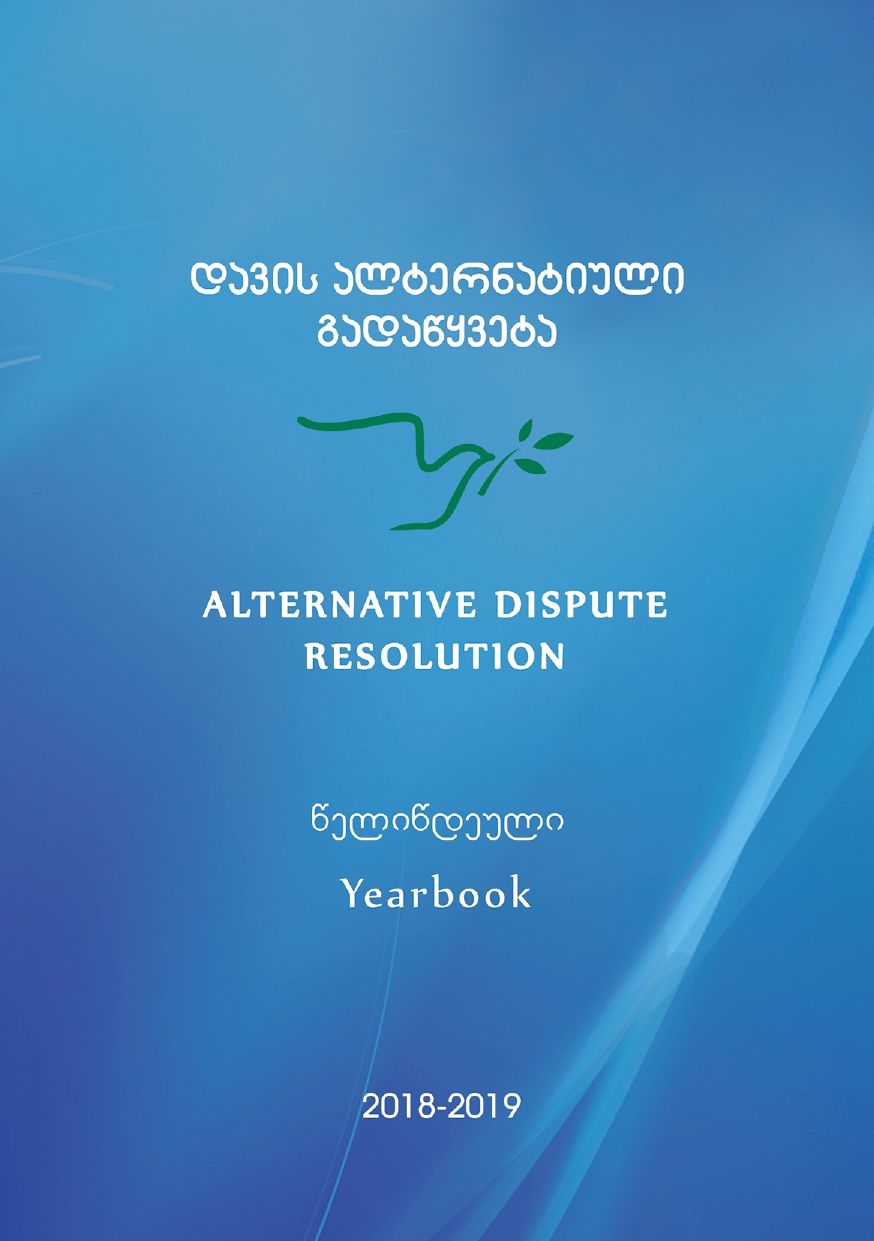მოსამართლის ფუნქცია სამოქალაქო საქმისწარმოების მორიგებით დამთავრებისას და შედეგები, რომელიც მიიღწევა მორიგებით
საკვანძო სიტყვები:
მორიგება, საქმისწარმოება, მოსამართლე, მომრიგებელი, მედიატორი, მოსამართლის კვალიფიკაცია, მოსამართლის კომპეტენცია, მოსამართლის ფუნქციები, მორიგების პროცესი, მორიგების შედეგი.ანოტაცია
მორიგება, როგორც სამოქალაქო საქმისწარმოების დამთავრების საფუძველი , სასამართლოს ფარგლებში ხორციელდება და, შესაბამისად, სასამართლოსმიერ მორიგებას წარმოადგენს. წარმატებული მორიგების ინიციატორი მოსამართლეა, რომელიც „მესამე პასიური მხარის" სტატუსით უნდა ჩეართოს მოლაპარაკების პროცესში და იკისროს ისეთი მნიშვნელოვანი ფუნქცია, როგორიცაა მოდავე მხარეების მორიგება. ტერმინი ,,მოსამართლე" უნივერსალური ცნებაა, თუმცა მორიგების პროცესში, მოსამართლეზე დამოკიდებული ვალდებულებებიდან გამომდინარე, მიზანშეწონილია ტერმინის ,,მომრიგებელი მოსამართლე" შემოღება, რომელიც ზედმიწევნით გამოხატავს მოსამართლის სტატუსს მორიგების პროცესში. მომრიგებელი მოსამართლეები დაინტერესებული უნდა იყვნენ სასამართლო სხდომის დარბაზში შექმნან სათანადო გარემოებები მორიგებისთვის, შეძლონ მოდავე მხარეთა ინტერესებში ზედმიწევნით გარკვევა, მხარეთა კონცენტრირება მორიგების საერთო მიზანსა და დავის საგანზე, რაც წარმატებული მორიგების საწინდარი უნდა გახდეს.
დავის მორიგებით დასრულება, მის ფაქტობრივად გადაწყვეტას, კონფლიქტის მოგვარებას უზრუნველუოფს, რაც დავის შედეგობრივი გადაწყვეტაა, როგორც მოდავე მხარეების, ისე სასამართლო სისტემისთვის. დავის მორიგებით დასრულების უმთავრესი საფუძველი მხარეთა თავისუფალი ნება და სურვილი, შედეგის მიღების მიზანია, რა დროსაც: ხდება კონფლიქტის მოგვარება, სამართლიანობის აღდგენა, ხანგრძლივი დავების თავიდან აცილება, მაღლდება სასამართლოსადმი ნდობა და ასევე იცვლება მოსამართლეთა დამიკიდებულება მორიგებისადმი. სამოქალაქო საქმისწარმოების მორიგებით დასრულებას მოდავე მხარეებისთვის მოაქვს რეალური შედეგი, რომელიც დავის საგნით გათვალისწინებული უფლებებისა და მოთხოვნების ორმხრივი დაკმაყოფილებით გამოიხატება.
წყაროები
The Constitution of Georgia, 24/08/1995.
Civil Procedural Code of Georgia, 14/11/1997.
European Charter on Judge’s Status, Strasbourg, 1998, 8.
Civil Procedural Code of Georgia, 14/11/1997.
The Law of Georgia On Introduction of Amendments and Additions into the Civil Procedural Code of Georgia“, №5669, 28/12/2007.
Code of Judicial Ethics of Georgia, adopted by the Resolution №6 dated June 23 2001 of the Conference of Judges of Georgia.
Bangalore Principles of Judicial Conduct and its comments, Tbilisi, 2015, 219.
Basic Principles on Court’s Independence”, Vol. 2, Tbilisi, 1999, 67.
Comments to the Code of Judicial Ethics of Georgia.
Council of Europe in Co-operation with the Consultative Council of European judges (CCJE), Strasburg, 24 and 25 November, 2003, 70.
Recommendation №R92(12) dated October 13 1994 of the Committee of Ministers of European Council “On Independence, Efficiency and Role of Judges“.
Practical Recommendations for Magistrate Judge, Supreme Court of Georgia Tbilisi, 2008 (In Georgian).
“Principles on Independence of Court”, adopted by the UN 7th Congress on Prevention of Crime and Treatment of Offenders, Milan, August 26 – September 6, 1985.
Abel R.L., A Comparative Theory of Dispute Institutions in Society, Law & Society Review, 1974, 227.
Akhvlediani Z., Mandatory Law, Tbilisi, 1999, 10, 99 (In Georgian).
Alschuler A.W., The Prosecutor's Role in Plea Bargaining, 36 U. Chi. L. Rev., 1968, 50.
Aubert V., Rettens sosiale funksjon, Oslo, 1976, 172.
Baar C., The Myth of Settlement, Paper Prepared for Delivery at the Annual Meeting of the Law and Society Association, Chicago, Illiois, 1999, 2.
Balant T. J., Independence of Court and Judge’s Profession, Tbilisi, 2013, 64.
Basic Directions of Judicial Reform, Supreme Court of Georgia, Journal “Martlmsajuleba” (Justice), №1, Tbilisi, 2006, 26, 28 (In Georgian).
Berghoff E. A., Fieweger M .J., Linguanti T. V. M., Morkin M. L., Vigil A.C. (eds.), Williams P., Stewart M., The International Negotiations Handbook, Success through Preparation, Strategy and Planning, A Joint Project from Baker & McKenie and The Public International Law & Policy Group, 2007, 9.
Bilsky L., Fisher T., Rethinking Settlement, Theoretical Iquiries in Law, 2014, 89.
Birke R., Fox C. R., Psychological Principles in Negotiation Civil Settlements, Harv. Neg. L. Rev., 1999, 1.
Brennan G., The Role of the Judge, National Judicial Orientation Programme, 1996.
Burgess H., Burgess G.M., Encyclopedia of Conflict Resolution, Santa Barbara, California, 1997, 74-75.
Certilman S. A., Judges as Mediators: Retaining Neutrality and Avoiding the Trap of Social Engineering, 2007, 24.
Chachanidze E., Zodelava T., Gogishvili M., Sulkhanishvili M., Communication in the Court, Tbilisi, 2013, 10, 22-23, 74 (In Georgian).
Cornes D., Commercial Mediation: The Impact of the Courts, Tomson, Sweet & Maxwell Limited, 2007, 13, 17.
Cory M.V., Danks Jr., How to Negotiate the Best Settlement, Miller & Cory 213 South Lamar Jackson, MS, 2011, 3.
Crane S. G., Judge Settlements Versus Mediated Settlements, Dispute Resolution Magazine, 2011, 21-22.
Cratsley J. C., Judicial Ethics and Judicial Settlement Practicis, Time for Two Strangers to Meet, Dispute Resolution Magazine, 2005, 16, 17.
Darjania T., Electronic System of Legal Proceedings, Georgian Experience of electronic Justice, Tbilisi, 2015, 6, 21 (In Georgian).
Ervasti K., Conflicts Before the Courts and Court-Annexed Mediation in Finland, Scandinavian Studies in Law, 1999-2012, 190-191, 193.
Floyd D. H., Can the Judge do this? – The Need for a Clearer Judicial Role in Settlement, Arizona State Law Journal, 1994, 48-49, 100.
Gabisonia I., Jury, Magistrate Courts and Conciliation Courts, Tbilisi, 2008, 98, 102, 100, 109, 342, 350 (In Georgian).
Ghibradze D., Relieving Judges and Distribution of Cases, “Court Independence and Judge’s Profession”, Tbilisi, 27/28 September, 2013, 49-61 (In Georgian).
Gilles P., Judicial System from Critical Sight: Comparative Analysis from German Position, “Samartlis Zhurnali” (“Magazine of Law”), №2, Tbilisi, 2009, 232-233, 235 (In Georgian).
Gleeson M., Future of Civil Justice Adjudication or Dispute Resolution, Otago Law Review, 1999, 454-455.
Glover J. M., The Federal Rules of Civil Settlement, Jurnal of International Law and Politics, 2012, 1723.
Grigalashvili N., “Accompanying Spirit”, newspaper “24 Hours”, published on April 20, 2010 (In Georgian).
Jorbenadze R., Mediation, Tbilisi, 2012, 13 (In Georgian).
Khubua G., Theory of Law, Tbilisi, 2015, 60 (In Georgian).
Kiria G., Teoretical-Practical Comments to the Revision of Court Decisions, according to the Civil Procedural Code of Georgia, Tbilisi, 2002, 7, 28 (In Georgian).
Kokhreidze L., Legal Aspects of Judicial Mediation, Journal “Martlmsajuleba da Kanoni” (“Justice and Law”), №4 (39)’13, Tbilisi, 2013, 22.
Kublashvili K., I will be the First Defender of Honest and Unbiased Judges, Supreme Court of Georgia, ‘’Martlmsajuleba”, №1, Tbilisi, 2006, 11 (In Georgian).
Kurdadze Sh., Khunashvili N., Civil Procedural Law, Tbilisi, 2012, 185-186, 195, 298-300, 396, 409, 559-560 (In Georgian).
Tezelishvili S., Legal Encyclopedia, Tbilisi, 2008, 376 (In Georgian).
Todua M., Kurdadze Sh., The Peculiarities of Decision- Making on Civil Cases of Certain Category, Association of Judges of Georgia, Tbilisi, 2005, 80-81 (In Georgian).
Lacey F. B., The Judge's Role in the Settlement of Civil Suits., Education and Traning Series, The Federal Judicial Center, Washington D. C., 2005, 5-6.
Lahav A., Fundamental Principles for Class Action Governance, 37 Ind. L. Rev. 65, 2003, 128, 136.
Lande J., Judging Judges and Dispute Resolution Processes, Nevada Law Journal, 2007, 457-458.
Les A., Cullen B., Settlement and Reform of the Civil Justice System: How Settlement is Changing the Practice of Law, Waikato Law Review, 2009, 39-40.
Liluashvili T., Liluashvili G., Khrustal V., Dzlierishvili Z., Civil Procedural Law, Part I, Tbilisi, 2014, 14, 21, 32, 40-45, 55, 98-105, 226-239 (In Georgian).
Liluashvili T., The Issues of Civil Proceedings in the Practice of Georgian Courts, Part I, Tbilisi, 2002, 114 (In Georgian).
Liluashvili T., Civil Procedural Law, 2nd ed., Tbilisi, 2005, 14, 18, 25, 65, 134, 147 (In Georgian).
Liluashvili T., Khrustal V., Comments to the Civil Procedural Code of Georgia, Tbilisi, 2007, 11-12, 480 (In Georgian).
Lutringhouse P., Methodology of Making Decision on Civil Case, Bakuriani, October 18-21, 2007, 133-135, 138, 143 (In Georgian).
Moffitt M., Pleading in the Age of Settlement, Indiana Law Journal, 2005, 737.
Ostermiller S. M., Svenson D. R., Alternative Dispute Resolution Means in Georgia, Tbilisi, 2014, 15, 123, 136.
Parness J. A., Improving Judicial Settlement Conferences, U.C. Davis Law Review, 2006, 1995.
Pogonowski P., Role of Judges and Party-autonomy in Settlement in Litigation, John Paul II Catholic University of Lublin, – Ol Pan, 2008, 153.
Resnik J., Mediating Preferences: Litigant Preferences for Process and Judicial Preferences for Settlement, Jurnal of Dispute Resolution, 2002, 155- 158.
Roberts K., What Judges Actually Do, Judges' Journal, 2010, 29.
Roberts S., Settlement as Civil Justice, Modern Law Review, 2000, 739.
Robbennolt J. K., Attorneys, Apologies and Settlement Nagotiation, Har. Neg. L.Rev., 2008, 34.
Rubenstein W. B., The Fairness Hearing: Adversarial and Regulatory Approaches, 53 Ucla L. Rev. 1435, 2006, 1452–66.
Sale H. A., Judges Who Settle, Washington University Law Review, Vol. 89, Issue 2, 2011, 385.
Shavliashvili G., City Court Will Become Available and Efficient for Citizen, Supreme Court of Georgia, “Martlmsajuleba”, №1, Tbilisi, 2006, 65-66 (In Georgian).
System Analysis of Judges’ Responsibility (National Legislation, International Standards and Local Practice), Tbilisi, 2014, 85 (In Georgian).
Tchanturia L., Boeling H., Methodology of Judicial Decision-Making on Civil Case, Tbilisi, 2003, 1, 51, 54-56, 89, 90, 92-93 (In Georgian).
The Issues of Ethics of Legal Professions (American Bar Association, the Rule of Law initiative), Washington, 2009, 89-142 (In Georgian).
Tsertsvadze G., Mediation, Alternative Dispute Resolution Form (General Overview), Tbilisi, 2010, 34, 66, 127, 168, 218, 236 (In Georgian).
Tsvetkov V. L., Psychology of Conflict, Tbilisi, 2015, 2013 (In Georgian).
Треушникова М. К. (ред.), Хрестоматия по Гражданскому Процесу, М., 1996, 62 (in Russian).
Ruling dated March 17, 2015 of the Chamber of Civil Cases of Tbilisi Appeal Court on the case: №2B/4963-14 (In Georgian).
Ruling dated June 06, 2012 of the Chamber of Civil, Entrepreneurial and Bankruptcy Cases of the Supreme Court of Georgia on the case: №AS-1770-1750-2011.
Ruling dated September 23, 2010 of the Chamber of Civil, Entrepreneurial and Bankruptcy Cases if the Supreme Court of Georgia on the case: №AS-513-482-10.
Ruling dated November 07, 2008 of the Chamber of Civil, Entrepreneurial and Bankruptcy Cases of the Supreme Court of Georgia on the case: №AS-346-598-08.
Ruling dated October 09, 2008 of the Chamber of Civil, Entrepreneurial and Bankruptcy Cases of the Supreme Court of Georgia on the case: №AS-436-678-08.
Ruling dated September 10, 2008 of the Chamber of Civil, Entrepreneurial and Bankruptcy Cases of the Supreme Court of Georgia on the case: №AS-621-846-08.
Ruling dated June 11, 2008 of the Chamber of Civil, Entrepreneurial and Bankruptcy Cases of the Supreme Court of Georgia on the case: №AS-302-559-08.
Ruling dated March 10, 2008 of the Chamber of Civil, Entrepreneurial and Bankruptcy Cases of the Supreme Court of Georgia on the case: №AS-95-375-08.









